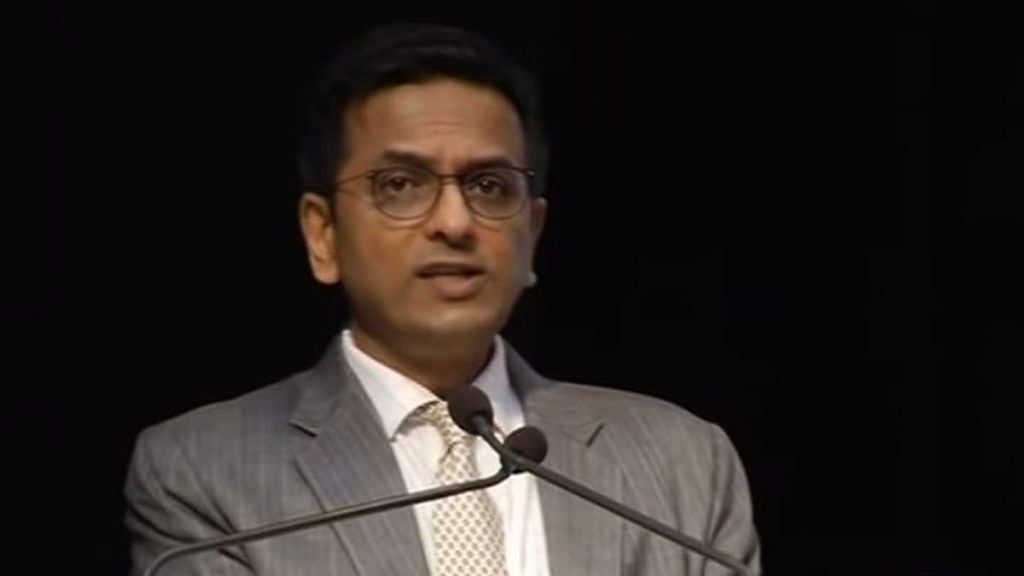New Delhi: Supreme Court judge, Justice D.Y. Chandrachud, Saturday said any state “committed to the rule of law” will never curb “legitimate” and “peaceful protests”, adding that “blanket labelling” of dissent as anti-national or anti-democratic strikes at the “heart” of the country’s commitment to protect Constitutional values.
His comments come amid nationwide protests against the Citizenship Amendment Act (CAA), the National Register of Citizens (NRC) and the National Population Register (NPR).
The judge, who is in line to become the Chief Justice of India in 2022, was delivering the Justice P.D. Desai Memorial Lecture at the Gujarat High Court.
Speaking on the topic, “The Hues That Are India: From Plurality to Pluralism”, Justice Chandrachud further said that use of state machinery to curb dissent instills fear and violates the rule of law.
ThePrint lists a few excerpts from the speech delivered Saturday.
Also read: Supreme Court upholds Modi govt’s SC/ST Amendment Act, says approval not needed for FIRs
Legitimate protest cannot be curbed
“A state committed to the rule of law ensures that the state apparatus is not employed to curb legitimate and peaceful protest but to create spaces conducive for deliberation. Within the bounds of law, liberal democracies ensure that their citizens enjoy the right to express their views in every conceivable manner, including the right to protest and express dissent against prevailing laws. The blanket labelling of such dissent as ‘anti-national’ or ‘anti-democratic’ strikes at the heart of our commitment to the protection of constitutional values and the promotion of a deliberative democracy.”
Deliberative dialogue needs to be protected
“An essential aspect of any successful democracy is its commitment to the protection of deliberative dialogue. Citizens manifest their equality not only by refraining from interference with the freedom of expression of others; they also do so by sustaining conditions conducive for free communication.”
Minority opinions cannot be strangulated
“The fine balance between majoritarianism and liberal democratic governance is marked by constitutional principles wedded to the rule of law, the guarantee of individual freedoms and ensuring freedom from discrimination. A democracy welded to the ideal of reason and deliberation ensures that minority opinions are not strangulated and ensures that every outcome is not a result merely of numbers but of shared consensus.”
Great threat to pluralism — suppression of differences
“Democracy then is judged not just by the institutions that formally exist but by the extent to which different voices from diverse sections of the people can actually be heard, respected and accounted for. The great threat to pluralism is the suppression of difference and the silencing of popular and unpopular voices offering alternate or opposing views. Suppression of intellect is the suppression of the conscience of the nation.”
Nobody can claim a monopoly on the idea of India
“When the Constituent Assembly was called to decide the fate of separate electorates in independent India, they decided that its inclusion was not essential to and even contrary to the requirements of a pluralistic society. They rejected separate electorates and dismissed the relevance of numerical disadvantage in a polity. The framers of the Constitution rejected the notion of a Hindu India and a Muslim India. They recognised only the Republic of India….
…Protecting dissent is but a reminder that while democratically elected governments offer us a legitimate tool for development and social coordination, they can never claim a monopoly over the values and identities that define our plural society.”
Attack on dissent is attack on democratic society
“The attack on dissent strikes at the heart of a dialogue-based democratic society and hence, a state is required to ensure that it deploys its machinery to protect the freedom of speech and expression within the bounds of law, and dismantle any attempt to instil fear or curb free speech,” he opined.”
Govt committed to dialogue does not restrict political contestation
“Inherent in the liberal promise of the Constitution is a commitment to a plurality of opinion. A legitimate government committed to deliberate dialogue does not seek to restrict political contestation but welcomes it…..taking democracy seriously requires us to respond respectfully to the intelligence of others and to participate vigorously, but as an equal in determining how we should live together.”
Also read: SC orders criminal records of candidates be published within 48 hours of selection
